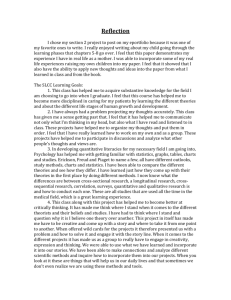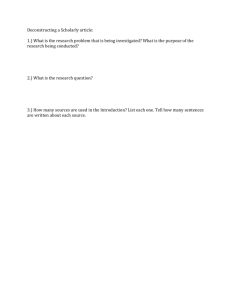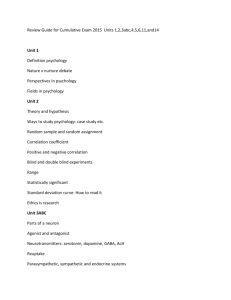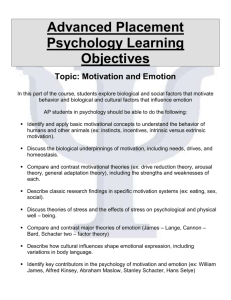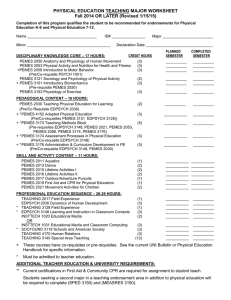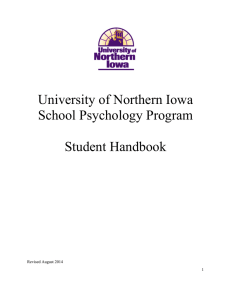Chapter One
advertisement
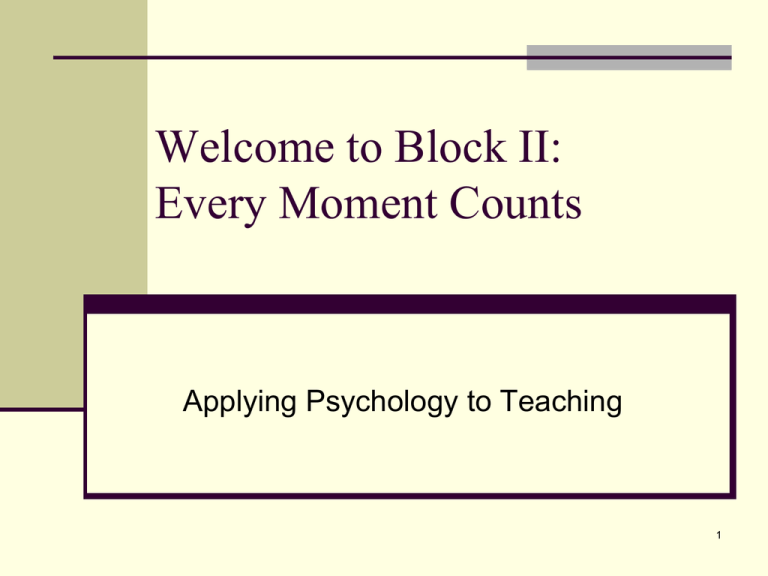
Welcome to Block II: Every Moment Counts Applying Psychology to Teaching 1 Inclusion Activity: Two Truths and a Lie write down two things that are true about yourself. Write one thing that is not true. Take turns guessing which statement is a lie as each person reads their statements. Others give reasons for their predictions of each lie statement. Participants “confess” their lies and explain why it could not be true. 2 Overview What is educational psychology? How will learning about educational psychology help you be a better teacher? The nature and values of science Complicating factors in the study of behavior and thought processes Reflective teaching: A process to help you grow and improve as a teacher 3 What Is Educational Psychology Educational psychology is… “A scientific discipline that is concerned with understanding and improving how students acquire a variety of capabilities through instruction in classroom settings” (p. 4). 4 Educational Psychology is the scientific discipline that addresses the questions “Why do some students learn more than others?” andto improve that “What can be done learning?” Threatening Kids with RED PEN-/failure Using Test Results as only source of testing for ability Not providing parents with appropriate alternatives 6 What do Educational Psychologist do? Educational psychologists study how students learn in classrooms Physical, cognitive, psychosocial development Cultural, social, emotional, and intellectual differences Learning and problemsolving processes Testing and measurement Self-esteem Motivation 7 Why is Research Important? Provides evidence that assists teachers to make appropriate choices in the classroom Descriptive studies Correlational Studies Experimental studies Action research 8 Descriptive Studies A research method used to describe the educational situation as it naturally occurs – what typically happens, how teachers teach, and how students learn and develop Example research question: “How do Ms. Newby organize the physical layout of her classroom? 9 Correlational Studies A research method used to measure two naturally occurring variables and summarize the nature and magnitude of their relationship in numerical form Example research question: “How is measured intelligence related to school achievement?” 10 Experimental Studies A research method used to test for a cause- and-effect relationship between two variables Example research question: “Is reading program A better than reading program B for teaching first graders to read?” 11 Action Research A research method carried out by teachers in their own classrooms to inform and refine their personal theories of teaching and classroom learning Example research question: “Do I ask boys more questions than I ask girls?” 12 How Will Learning About EdPsych Help You Be a Better Teacher 1. Teaching is complex work because it requires a wide range of knowledge and skills Ranks in top quartile on complexity for all occupations Constantly making decisions; before, during, and after instruction Requires a reservoir of knowledge and skills EdPsych provides knowledge regarding... learning and development, individual differences, motivation, self-concept, assessment, classroom management, and various approaches to instruction How Will Learning About EdPsych Help You Be a Better Teacher 2. Research in EdPsych offers many useful ideas for improving classroom instruction Giving positive reinforcement/corrective feedback Communicating expectations Requiring higher-order responding Monitoring and improving own learning efforts Knowing misconceptions students bring to class Creating learning situations (variety) Showing student how to work in small groups Accepting responsibility for student outcomes How Will Learning About EdPsych Help You Be a Better Teacher 3. Teachers who have had professional training are generally more effective Most beginning teachers rate their preparation as adequate or well prepared Grades in teacher-education courses better indicator of success in teaching secondary level than GPA or specialty area grades Cases of dramatic improvements after taking teacher-education courses Take a Stand What Kind of Research Should Guide Education? See p. 15 in Every Moment Counts Textbook 16 The Nature and Values of Science Unsystematic observation may lead to false conclusions When you make generalizations and you try to explain it with common sense or you gut feeling you fail to recognize the complexitities of teaching and learning 17 The Nature and Values of Science Grade retention policies are influenced by unsystematic observation Retention rate (K-8) as high as 20% in U.S. Likely to increase as under more accountability laws enacted Research clearly shows negative effects 40-50% more likely to drop out Lower self-concept and emotional adjustment Low achievers learn more when promoted Goal is to prevent need for retention 18 Educational Psychology Matters What is a theory? An intellectual framework that organizes a vast amount of knowledge about a phenomenon so that educators can understand and explain better the nature of that phenomenon 19 Stage Theories There are hundreds of theories to explain human development, learning, motivation, and teaching. Through this course we will explore the theories of: Jean Piaget Sigmund Freud Erik Erickson 20 Learning Theories Behaviorism Information Processing Social Cognitive Theory 21 Contextual Theories Lev Vygotsky Urie Bronfenbrenner 22 What is Good Teaching www.myeducationlab Woolfolk Text Chapter 1 Activity 3 As you watch the video think about how your personal experiences inform your vision of yourself as a teacher. 23 Reflective Teaching Reflective teachers possess: An introspective orientation An open-minded but questioning attitude about educational theories and practices The willingness to take responsibility for decisions and actions 24 Ways to Become a Reflective Teacher Use the readings from each chapter and class discussions to gather ideas Use Chapter Responses to help reflect on your own teaching experiences/ beliefs Analyze your biases and critically review your own teaching practices 25 Remember that Teaching is a Process We shall not cease from exploration And the end of all our exploring Will be to arrive where we started And know the place for the first time. (T. S. Eliot, Four Quartets, 1969) 26
